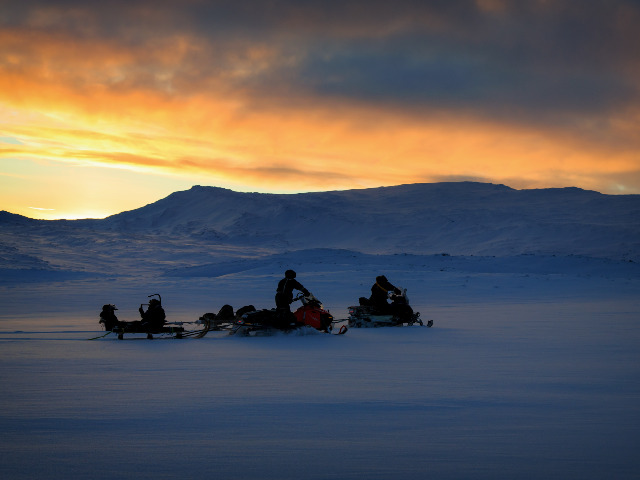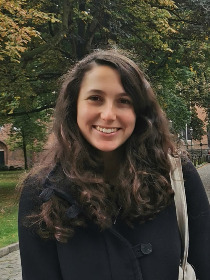Knowledges in the Arctic 2: Understanding what is behind it
| Datum: | 21 april 2022 |
| Auteur: | Francesca Brunner |

The Arctic Centre has a line of research and action on Knowledge Co-Creation, in which I am doing my placement. The work aims to promote co-creation in Arctic Research at a European and International level while encouraging a dialogue on topics like the researcher relationships, roles in transdisciplinarity, youth engagement, self-determinism, and ethical matters regarding research in this specific region. This is because more and more global actors, like the European Union, are interested in mobilizing indigenous knowledge and promoting community participation to enhance development in a sustainable way[1].
Accordingly, if we want to create more knowledge for better decision-making, working together with other knowledge-holders and with a variety of methodologies, can only enhance the process. For example, as research tries to become more decolonized in the Arctic, efforts are being made for right-holders of traditional knowledge to contribute to research on their own terms and depending on their own interests. This is to say, research is finding ways to promote the involvement of indigenous communities that have knowledge of their region in a manner that guarantees their ownership and consent, and also promotes research that is actually useful and meaningful for the Arctic and those that live in it.
In theoretical settings, there is an understanding that knowledge influences how we perceive reality and how we make decisions[2]. Thus, the type of knowledge established is the one with the most influence, and those that hold that knowledge gain influence as well. In other words, there is some power politics involved in knowledge. Here, the concept of knowledge policy might be useful, which is when by anticipating possible uses of the new scientific and technical knowledge, it is regulated[3]. This regulation can be done, for example, by the conscious or unconscious bias of funding institutions and calls[4] that prioritize scientific methodologies, while omitting, for example, indigenous methodologies or inter-generational local knowledge.
The idea is that if knowledge is already available, then it should be also considered and included[5]. In order to make better decisions in politics or governance, the knowledge available should be wide-ranging and all-inclusive. This, since politics regulates behaviors, and regulating is better based on knowledge than if not[6]. And knowledge influences the perspectives on reality, and this influence is better based on an inclusive approach to research than if not.
Literature:
Grundmann, R., & Stehr, N. (2003). Social control and knowledge in democratic societies. Science and Public Policy, 30(3), pp. 183–188. https://doi.org/10.3152/147154303781780524
Haas, P. (1992). Introduction: Epistemic Communities and International Policy Coordination. International Organization, 46(1), pp.1-35. Retrieved February 25, 2021, from http://www.jstor.org/stable/2706951
Hasenclever, A., Mayer, P., & Rittberger, V. (1997). Knowledge-based theories: ideas, arguments, and social identities. In: Theories of international regimes (Ser. Cambridge studies in international relations, no. 55). Cambridge University Press, pp. 136-210. https://doi.org/10.1017/CBO9780511521720
Martello, M. Jasanoff, S. (2004). Introduction Globalization and Environmental Governance. In: Jasanoff, S. Martello, M. (Eds) Earthly Politics: Local and Global in Environmental Governance, pp 1-29. The MIT Press. ISBN: 9780262101035
Merrild, A., Ren, C. (Eds.) (2021). Collaborative research methods in the aArctic: experiences from Greenland (Ser. Routledge research in polar regions). Routledge. Retrieved March 7, 2022, from https://www.taylorfrancis.com/books/9781003030843
Bäckstrand, K. (2003). Civic Science for Sustainability: Reframing the Role of Experts, Policy-Makers and Citizens in Environmental Governance. Global Environmental Politics, 3(4), 24–41. https://doi.org/10.1162/152638003322757916
[1] See Martello & Jasanoff, (2004, p.8)
[2] See Hasenclever et al. (1997, p.140)
[3] See Grundmann & Stehr (2003, p.184)
[4] See Haas (2004, p.572)
[5] See Merrild & Ren (2021, p.20)
[6] See Merrild & Ren (2021, p.19)
Over de auteur

Francesca is a master student International Relations and International Organizations at the University of Groningen and an intern at the Arctic Centre.

